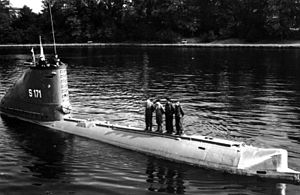German submarine U-2359
 Postwar photo of Hecht (S 171), (former Type XXIII submarine U-2367). An identical sister ship of U-2359.
| |
| History | |
|---|---|
| Name | U-2359 |
| Ordered | 20 September 1944 |
| Builder | Deutsche Werft AG, Hamburg |
| Yard number | 513 |
| Laid down | 3 November 1944 |
| Launched | 23 December 1944 |
| Commissioned | 16 January 1945 |
| Fate | Sunk on 2 May 1945 |
| General characteristics | |
| Class and type | Type XXIII submarine |
| Displacement | |
| Length | |
| Beam |
|
| Draught | 3.66 m (12 ft) |
| Installed power |
|
| Propulsion |
|
| Speed |
|
| Range |
|
| Test depth | 180 m (590 ft) |
| Complement | 14–18 |
| Armament |
|
| Service record | |
| Part of: |
|
| Identification codes: | M 50 300 |
| Commanders: | |
| Operations: | None |
| Victories: | None |
German submarine U-2359 was a Type XXIII U-boat of Nazi Germany's Kriegsmarine during World War II. She was ordered on 20 September 1944, and was laid down on 3 November 1944 at Deutsche Werft AG, Hamburg, as yard number 513. She was launched on 23 December 1944 and commissioned under the command of Oberleutnant zur See Gustav Bischoff on 16 January 1945.[2]
Design[edit]
Like all Type XXIII U-boats, U-2359 had a displacement of 234 tonnes (230 long tons) when at the surface and 258 tonnes (254 long tons) while submerged. She had a total length of 34.68 m (113 ft 9 in) (o/a), a beam width of 3.02 m (9 ft 11 in) (o/a), and a draught depth of3.66 m (12 ft). The submarine was powered by one MWM six-cylinder RS134S diesel engine providing 575–630 metric horsepower (423–463 kilowatts; 567–621 shaft horsepower), one AEG GU4463-8 double-acting electric motor electric motor providing 580 PS (430 kW; 570 shp), and one BBC silent running CCR188 electric motor providing 35 PS (26 kW; 35 shp).[3]
The submarine had a maximum surface speed of 9.7 knots (18.0 km/h; 11.2 mph) and a submerged speed of 12.5 knots (23.2 km/h; 14.4 mph). When submerged, the boat could operate at 4 knots (7.4 km/h; 4.6 mph) for 194 nautical miles (359 km; 223 mi); when surfaced, she could travel 2,600 nautical miles (4,800 km; 3,000 mi) at 8 knots (15 km/h; 9.2 mph). U-2359 was fitted with two 53.3 cm (21 in) torpedo tubes in the bow. She could carry two preloaded torpedoes. The complement was 14 – 18 men.[3] This class of U-boat did not carry a deck gun.[2]
Service history[edit]
On 2 May 1945, U-2359 was sunk by rockets in the Kattegat. U-2359 was attacked by Mosquitos of British 143 Squadron, 235 Squadron, 248 Squadron, Canadian 404 Squadron, and Norwegian 333 Squadron. The entire crew of twelve men were all lost.[2]
The wreck is located at 57°29′N 11°24′E / 57.483°N 11.400°E
See also[edit]
References[edit]
- ^ Helgason, Guðmundur. "Gustav Bischoff". Uboat.net. Retrieved 30 April 2016.
- ^ a b c Helgason, Guðmundur. "U-2359". Uboat.net. Retrieved 30 April 2016.
- ^ a b Gröner 1991, p. 89.
Bibliography[edit]
- Busch, Rainer; Röll, Hans-Joachim (1999). German U-boat commanders of World War II : a biographical dictionary. Translated by Brooks, Geoffrey. London, Annapolis, Md: Greenhill Books, Naval Institute Press. ISBN 1-55750-186-6.
- Gröner, Erich; Jung, Dieter; Maass, Martin (1991). U-boats and Mine Warfare Vessels. German Warships 1815–1945. Vol. 2. Translated by Thomas, Keith; Magowan, Rachel. London: Conway Maritime Press. ISBN 0-85177-593-4.
- Williamson, Gordon (2005). Wolf Pack: The Story of the U-boat in World War II. Osprey. ISBN 1841768723.
External links[edit]
- Helgason, Guðmundur. "U-2359". Uboat.net. Retrieved 30 April 2016.
